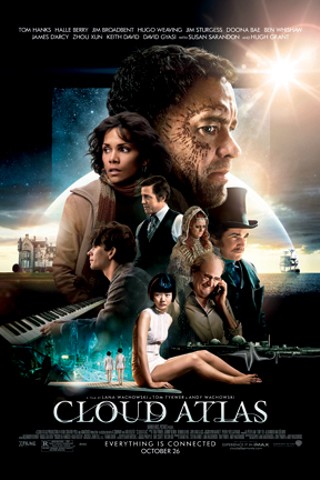Some books, they say, aren't cut out to be movies. Maybe they're too long, like Atlas Shrugged. Sure, that's been made into a limp two-parter over the past couple of years, but its existence more or less proves the point.
Maybe some of these unfilmable books are simply not cinematic. Or, as is the case with Cloud Atlas, perhaps they're simply too cinematic.
Come again?
Yes, Cloud Atlas, based on David Mitchell's 2004 novel that combines six separate but connected narratives, is far too cumbersome and throws too many ideas and elements at the screen, all of them struggling for air in the dog pile of details. Even spread over more than 2 1/2 hours, the film is difficult to process, but still somehow feels incomplete.
It is, no doubt, a fascinating experiment. Driven by Lana and Andy Wachowski, the siblings behind The Matrix, and German director Tom Tykwer (Run Lola Run), Cloud Atlas is broken into parts, with the Wachowskis and Tykwer each taking three chapters. To ground the stories and—because there is so much going on—to ground the audience, the filmmakers have cast a handful of actors appearing in multiple roles. Tom Hanks, Halle Berry, Jim Sturgess, Hugh Grant, Jim Broadbent, Susan Sarandon and Keith David all play many characters; Wachowski favorite Hugo Weaving has smaller roles in all six episodes.
There is another, more-thematic reason to recycle the players: Cloud Atlas pushes the idea that everything that was, is and will be is fundamentally connected. Therefore, a story with Tom Hanks and Halle Berry that takes place in the Watergate era reverberates hundreds of years into the future, when Hanks and Berry cross paths again. It's easy to go along with that premise, made easier through efficient casting, but there's a shocking reliance by the filmmakers on fake noses, and that ruins the experience. They're dreadful. Laughable. If you have Tom Hanks popping up across centuries as different characters, but you still want to drive home the point that it's Tom Hanks, why even bother with such amateurish prosthetics?
Even stranger is how magnificent every other aspect of the film looks. It's pristine. A Victorian-era merchant ship and its crew look right at home, as does San Francisco in the 1970s. Just as believable are the landscapes invented for the film—a dystopian Seoul, South Korea, now the automated Neo Seoul, and a post-apocalyptic Hawaii.
The hook in most of the stories is that love is timeless, which is why reincarnated characters have a connection to each other hundreds of years after a previous story. The circumstances are different, but each story reinforces the others. In Mitchell's book, the chapters are also linked chronologically, so a character in a later story knows about the story that just happened. The film thinly attempts that, but it's not handled well.
Two of these episodes don't find any traction. Sadly, they're the ones in which Jim Broadbent has his most-central roles, and he's still great in them. The first involves a brilliant but struggling musician in the 1930s who, due to the traditions of the day, can't be with the man he loves. The second is about a publisher whose brother has him involuntarily committed; it's played for laughs, which is not a strength of the Wachowskis or Tykwer. Had either story been allowed more time to breathe, the results likely would have been better. But they stand out by not fitting in structurally.
Two other episodes are just OK. In the 1850s, a young notary (Sturgess) is traveling back to San Francisco from the South Pacific. He encounters a shady doctor (Hanks) who, under the guise of treating him for an intestinal illness, is actually poisoning the notary for his gold. The most-futuristic of these chapters takes place in Hawaii after, we imagine, a nuclear war. It has real potential, but because it shares the stage with everything else, the highly affected Pidgin English spoken by Hanks and Halle Berry is impossible to consistently decipher, making the story a major obstacle.
The shining lights are the 1970s arc with Berry as a journalist investigating a rising nuclear-power company, and Neo Seoul, the film's only complete vision. It's right up the Wachowskis' alley, and has the most atmosphere and activity. Of the stories presented, it is likely the only one that could be a milestone film on its own. Too much like The Matrix? Perhaps, but it's better to repeat a good effort (well, considering the first Matrix, anyway) than cook up a muddled would-be epic.
Defenders of this film will argue that you need to read the book to truly understand Cloud Atlas, and it probably couldn't hurt to watch the film multiple times. Either or both might be true, but that also speaks to how flawed the film really is. Great movies don't require that you read source material, and you only watch them again because they were so inescapable the first time.
Cloud Atlas may be a magnificent mess, but it's still a mess.











